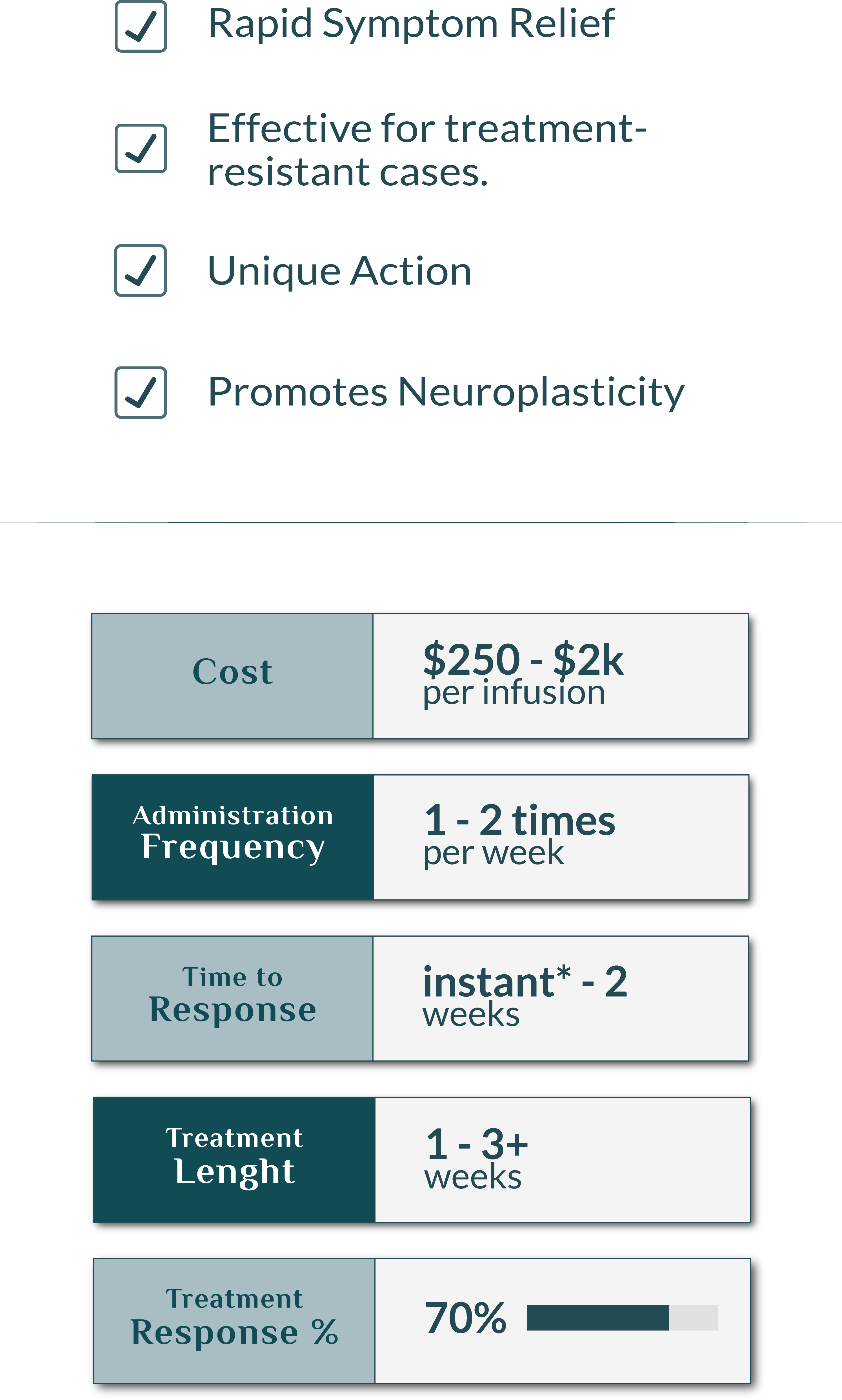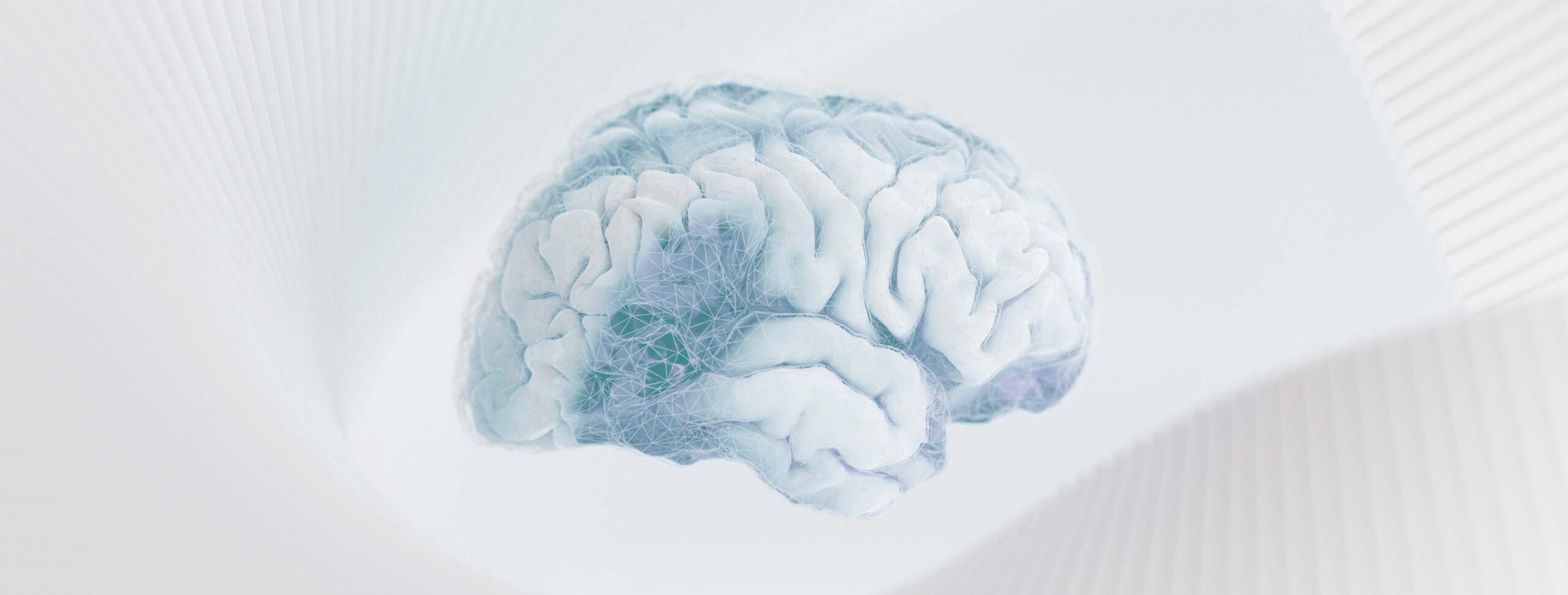About Ketamine
Learn about ketamine research, news, the infusion process and other frequently asked questions.











What is Ketamine Therapy?
Ketamine therapy is a medical treatment that uses low doses of ketamine, originally developed as an anesthetic, to address mental health conditions and chronic pain. Unlike traditional psychiatric medications that can take weeks to show effects, ketamine often produces rapid improvements


At Emerge Ketamine, we provide ketamine therapy through intravenous (IV) infusions. This means the medication will be delivered directly into the bloodstream via a small IV line, allowing for precise control over the dosage and ensuring consistent absorption.
Infusions take place in a calm, supervised setting and last about 40–60 minutes, and patients are monitored throughout the process.
The Science of Ketamine Therapy
Ketamine works differently from traditional antidepressants and pain medication. It affects glutamate, a chemical messenger that plays a key role in brain signaling. By boosting activity in the prefrontal cortex, a part of the brain often less active in people with mood disorders, ketamine can help improve symptoms.
It also enhances neuroplasticity, the brain’s ability to reorganize and form new connections. This process may help repair disrupted neural pathways linked to mental health conditions and chronic pain. Neuroplasticity also makes the brain more adaptable, potentially making it easier for individuals to break free from harmful behavior patterns.


Who Can Benefit From Ketamine Therapy?
Ketamine in the Press
Ketamine therapy is a medical treatment that uses low doses of ketamine, originally developed as an anesthetic, to address mental health conditions and chronic pain. Unlike traditional psychiatric medications that can take weeks to show effects, ketamine often produces rapid improvements

Behind the Buzz: How Ketamine Changes the Depressed Patient’s Brain Is Ketamine the Next Big Depression Drug?
- Scientific Articles & Research

ScienceDirect
Systematic Review And Meta-analysis Of The Efficacy Of Intravenous Ketamine Infusion For Treatment Resistant Depression: January 2009 – January 2019.
Comparative efficacy of racemic ketamine and esketamine for depression: A systematic review and meta-analysis
Harvard Medical School
Systematic Review And Meta-analysis Of The Efficacy Of Intravenous Ketamine Infusion For Treatment Resistant Depression: January 2009 – January 2019.
Comparative efficacy of racemic ketamine and esketamine for depression: A systematic review and meta-analysis
National Institute of Health
Systematic Review And Meta-analysis Of The Efficacy Of Intravenous Ketamine Infusion For Treatment Resistant Depression: January 2009 – January 2019.
Comparative efficacy of racemic ketamine and esketamine for depression: A systematic review and meta-analysis
U.S. Food & Drug Administration
Systematic Review And Meta-analysis Of The Efficacy Of Intravenous Ketamine Infusion For Treatment Resistant Depression: January 2009 – January 2019.
Comparative efficacy of racemic ketamine and esketamine for depression: A systematic review and meta-analysis
National Library of Medicine
Systematic Review And Meta-analysis Of The Efficacy Of Intravenous Ketamine Infusion For Treatment Resistant Depression: January 2009 – January 2019.
Comparative efficacy of racemic ketamine and esketamine for depression: A systematic review and meta-analysis
American Journal of Psychiatry
Systematic Review And Meta-analysis Of The Efficacy Of Intravenous Ketamine Infusion For Treatment Resistant Depression: January 2009 – January 2019.
Comparative efficacy of racemic ketamine and esketamine for depression: A systematic review and meta-analysis
Yale Medicine
Systematic Review And Meta-analysis Of The Efficacy Of Intravenous Ketamine Infusion For Treatment Resistant Depression: January 2009 – January 2019.
Comparative efficacy of racemic ketamine and esketamine for depression: A systematic review and meta-analysis
Addiction Treatment
Systematic Review And Meta-analysis Of The Efficacy Of Intravenous Ketamine Infusion For Treatment Resistant Depression: January 2009 – January 2019.
Comparative efficacy of racemic ketamine and esketamine for depression: A systematic review and meta-analysis
Mental Health and Substance Abuse Treatment
Systematic Review And Meta-analysis Of The Efficacy Of Intravenous Ketamine Infusion For Treatment Resistant Depression: January 2009 – January 2019.
Comparative efficacy of racemic ketamine and esketamine for depression: A systematic review and meta-analysis
Ketamine and Therapy for Alcohol Abuse
Systematic Review And Meta-analysis Of The Efficacy Of Intravenous Ketamine Infusion For Treatment Resistant Depression: January 2009 – January 2019.
Comparative efficacy of racemic ketamine and esketamine for depression: A systematic review and meta-analysis
National Institutes of Health researchers found that a single, low-dose ketamine infusion was relatively free of side effects for patients with treatment-resistant depression.
Frequently Asked Questions
About Ketamine Therapy
Answers from Boston’s Trusted Ketamine Clinic
How effective is ketamine treatment?
Ketamine’s effectiveness varies and depends on several factors, such as a patient’s medical history and condition severity. However, clinical studies show that around 50-70% of individuals with depression experience significant relief following ketamine therapy.
Do I need a referral?
No referral is needed for the complimentary consultation with our staff. However, some insurances require a referral prior to the initial medication and for treatment.
What conditions can ketamine treat?
At Emerge Ketamine, we treat a wide range of mental health and pain conditions, including:
- Major Depression
- Bipolar Depression
- Anxiety
- PTSD
- OCD
- Chronic Pain Syndromes
- Addiction and Substance Use Disorders
What happens during my first treatment?
Ketamine is delivered via IV over 40 minutes. Most people begin to feel lightness, floating, or dream-like sensations around the halfway point. Common experiences include heightened senses, euphoria, and a sense of detachment. Side effects like nausea, dizziness, or mild anxiety may occur but typically fade within an hour or two.
Important: You cannot drive post-treatment. Please arrange for someone to accompany you home.
How should I prepare for ketamine therapy?
- No solid food for 5 hours before your infusion
- Clear liquids (like water, broth, or apple juice) are OK until 2 hours before
- Avoid alcohol and recreational drugs entirely
- No solid food for 5 hours before your infusion
- Follow any medication instructions from our team.
How long do the effects last?
One infusion can offer relief for 2 to 14 days. A typical series of six infusions often leads to longer-lasting benefits—weeks or even months. Booster infusions can help maintain results.
How can I get the best results?
Support your treatment by:
- Eating a balanced diet
- Exercising regularly
- Staying socially connected
- Engaging in talk therapy
Ketamine can help make these steps more manageable by quieting symptoms and enhancing cognitive flexibility.
Is ketamine addictive?
When used responsibly in clinical settings, ketamine is typically non-addictive. However, ketamine is a drug of abuse and can cause dependence if misused.
Can I stop my other medications or therapy?
No. Ketamine therapy is meant to enhance, not replace, your existing care. Do not stop any medications or therapy without consulting your prescribing provider.
Still Have Questions?
Are You a Candidate?
Request a consultation with Emerge Ketamine and discover if you are a candidate for ketamine treatments.
Get In touch
Contact Us for Pricing
During your initial telemedicine evaluation, we will answer any questions you have about IV ketamine therapy, and assess how it can enhance your healing.






